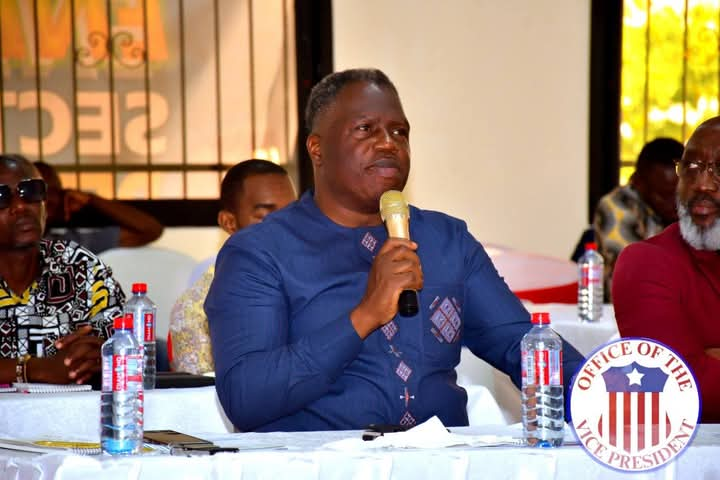Vice President Jeremiah Kpan Koung has immersed himself in the Nimba County senatorial by-election, driven by a conviction that the former ruling Coalition for Democratic Change (CDC) is orchestrating a complex political maneuver. Koung believes the CDC’s strategy is designed to sow discord among the people of Nimba County, ultimately aiming to fracture their voting power in the 2029 presidential elections. This by-election, necessitated by the passing of Senator Prince Yormie Johnson, has become a focal point of political tension, with Koung perceiving it as a calculated move by the CDC to undermine Nimba’s historically unified political influence.
At the heart of Koung’s concern is the candidacy of Edith Gongloe-Weh. He argues that the CDC is backing her candidacy, not necessarily for her victory, but to trigger a chain of events that would lead to the division of Nimba’s electorate. Koung theorizes that if Gongloe-Weh were to win, it would create an imbalance in the senatorial representation, with two senators hailing from the Mahn ethnic group. This, he believes, would incite tensions between the Mahn and Dahn tribal groups, ultimately weakening Nimba’s collective voting power. He further alleges that the CDC has strategically fielded additional candidates to dilute the Dahn vote, increasing Gongloe-Weh’s chances and exacerbating potential inter-tribal friction.
Koung’s apprehension stems from Nimba County’s pivotal role in past presidential elections. He emphasizes that Nimba has consistently been a kingmaker since 1997, influencing the outcomes of presidential races and holding significant sway in Liberian politics. He cites examples of Nimba’s decisive influence in the 2005, 2011, 2017, and 2023 elections, arguing that the CDC is aware of this historical pattern and aims to dismantle Nimba’s unified voting bloc to secure an advantage in 2029. He believes that the CDC sees the absence of the unifying figure of the late Senator Johnson as an opportunity to exploit potential divisions within the county.
Koung’s argument extends beyond the immediate by-election. He references historical precedents of tribal balance in Nimba’s senatorial representation, dating back to the county’s formation in 1964. He highlights the tradition of maintaining representation from both the Mahn (Gio) and Dahn (Mano) tribes to ensure peace and prevent disunity. He recalls instances where this balance was disrupted, specifically mentioning the 2011 elections when Gongloe-Weh’s candidacy, against the counsel of then-President Ellen Johnson Sirleaf, allegedly led to the Mahn people losing a senatorial seat for the first time since 1964. Koung portrays this as an act of political greed that destabilized the county’s traditional power-sharing arrangement.
The Vice President recounts his own efforts to restore the traditional balance after the 2011 elections, working with Senator Prince Johnson to ensure representation from both tribes. He emphasizes the importance of this balance for maintaining peace and unity within Nimba. He now views Gongloe-Weh’s current candidacy as a renewed threat to this delicate balance and a potential catalyst for further division. He argues that Nimba needs an experienced senator who can effectively represent the county’s interests, and that the senate is not a place for on-the-job training, implicitly suggesting that Gongloe-Weh lacks the necessary experience.
Koung frames his involvement in the by-election as a protective measure against the CDC’s alleged machinations. He stresses the importance of maintaining Nimba’s political strength and electoral influence, particularly in the absence of Senator Johnson’s leadership. He portrays himself as a guardian of Nimba’s interests, warning against the potential consequences of the CDC’s alleged plot. He asserts that he has a responsibility to inform the people of Nimba about these political maneuvers, emphasizing that if his warnings are ignored, history will record his efforts to safeguard the county’s political future. He casts the by-election as a critical juncture for Nimba, urging the people to choose wisely to preserve their unity and political power.














